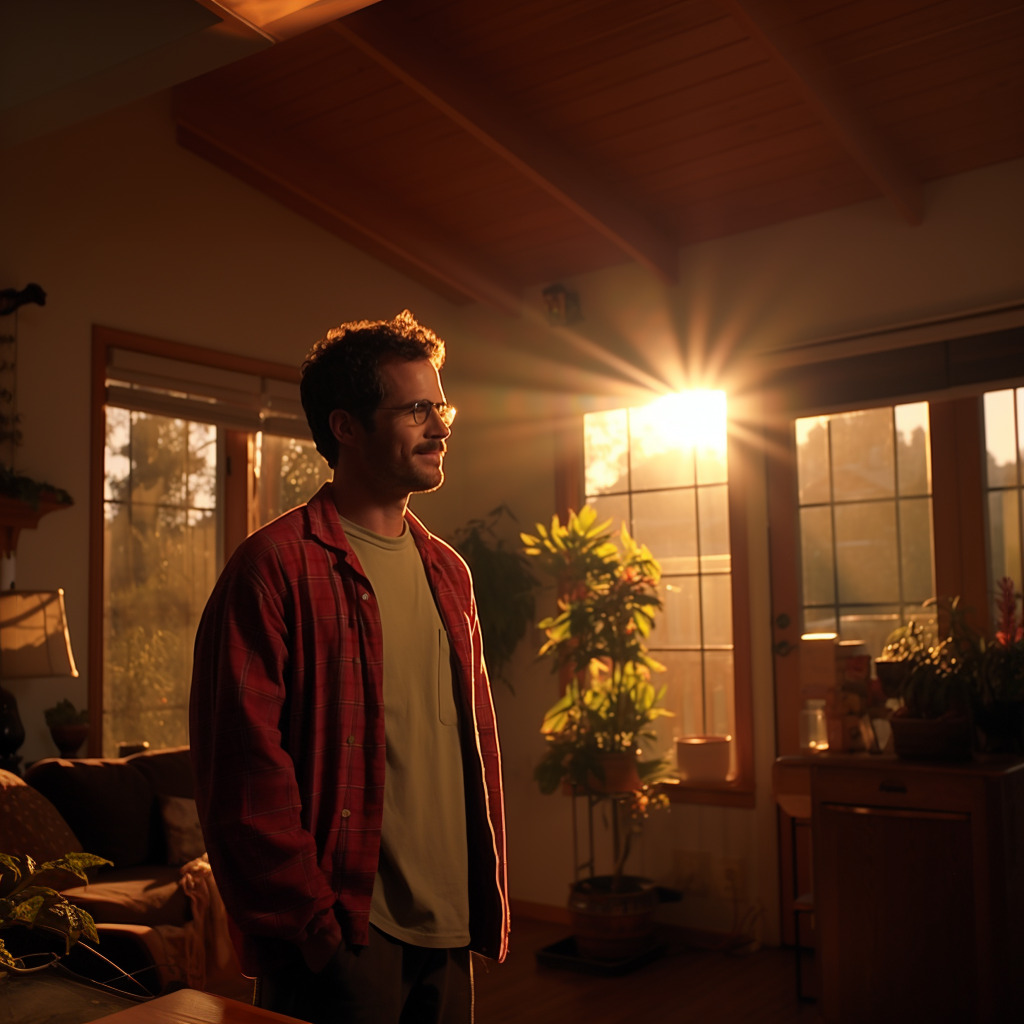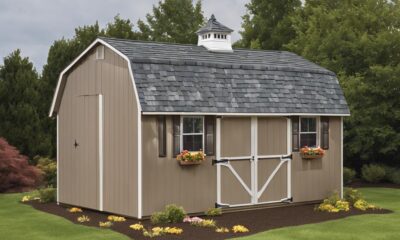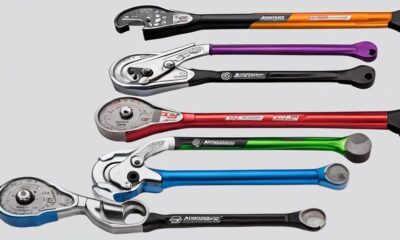Beginners Guides
How to Build 12’x20′ Concrete Slab Design for Swim Spa
2025

Alright everyone, let’s dive right in!
Today, we’re going to show you how to build a 12’x20′ concrete slab design for your swim spa.
We’ll guide you through each step of the process, from site preparation and excavation to pouring the concrete and finishing techniques.
Our goal is to provide you with the technical know-how and precise instructions you need to create a solid foundation for your swim spa.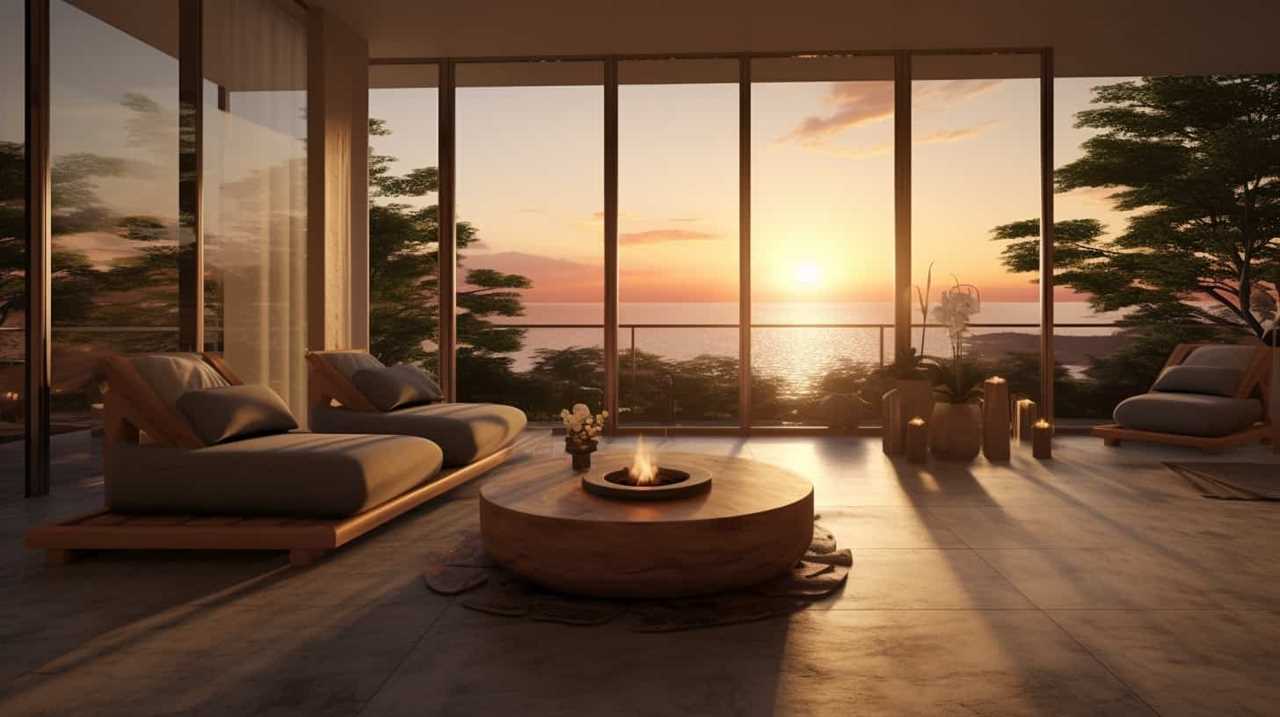
So, let’s get started and make your swim spa dreams a reality!
Key Takeaways
- Clear the area and level the ground for the swim spa concrete slab, ensuring proper soil stabilization and compaction.
- Excavate the area to the appropriate depth and slope to accommodate the swim spa and allow for efficient water runoff.
- Install reinforcement and framing, considering factors such as load requirements and rebar installation type.
- Pour and cure the concrete properly, considering the use of additives and applying a concrete sealer for enhanced durability and protection.
Site Preparation
We’ll need to start by clearing the area and leveling the ground for the swim spa concrete slab. Proper site preparation is crucial to ensure a stable and durable foundation for your swim spa.
The first step is to assess the grading techniques required to achieve a level surface. This may involve removing any existing vegetation, rocks, or debris that could interfere with the slab’s construction.
Additionally, conducting soil testing is essential to determine the soil’s composition and load-bearing capacity. This information helps us make informed decisions about the necessary measures to take, such as soil stabilization or compaction, to ensure the slab’s longevity.
Excavation and Grading
First, let’s talk about the depth and slope requirements for the excavation. It’s crucial to dig the area to the proper depth to accommodate the swim spa and allow for proper drainage.
Additionally, the slope should be carefully graded to ensure water will flow away from the spa and prevent any potential pooling or flooding.
Lastly, we must emphasize the importance of proper compaction during the excavation process. This helps to create a stable base for the concrete slab and ensures it will withstand the weight of the swim spa over time.
Depth and Slope Requirements
Our team’s first step in determining the depth and slope requirements for excavation and grading is to evaluate the site conditions. Slope considerations are crucial to ensure proper drainage and prevent any water pooling around the concrete slab. In general, a slope of 1/8 inch per foot is recommended to allow for efficient water runoff. However, this may vary depending on the specific site conditions and local building codes.
As for depth recommendations, it’s important to excavate the area to a sufficient depth to accommodate the concrete slab and any necessary reinforcement. This depth will typically be determined by factors such as the load-bearing capacity of the soil and the specific requirements of the swim spa.
Proper excavation and grading are essential for a solid foundation, which brings us to the next section – the importance of proper compaction.
Importance of Proper Compaction
To ensure a stable foundation, our team emphasizes the importance of proper compaction during excavation and grading. Proper compaction is essential for achieving soil stability, which is crucial for the longevity and durability of the concrete slab design for a swim spa.
During excavation, it’s important to remove any organic materials, debris, and loose soil from the site. This ensures a clean and stable base for the concrete slab. Grading involves shaping the excavated area to achieve the desired slope and levelness. Proper grading ensures proper drainage and prevents water pooling, which can lead to soil erosion and instability.
Once the excavation and grading are complete, proper compaction techniques should be applied to achieve optimal soil density. This involves using compaction equipment, such as compactors or rollers, to compact the soil layers evenly. Adequate compaction minimizes the risk of settlement or shifting of the concrete slab over time.
Reinforcement and Framing
We’ll need to determine the amount of reinforcement and framing required for the 12’x20′ concrete slab design for our swim spa. Reinforcement plays a crucial role in ensuring the strength and durability of the slab, while framing provides support and structure. To calculate the amount of reinforcement needed, we must consider factors such as the load requirements and the type of rebar installation. Additionally, formwork construction is essential for creating the framework that will hold the concrete in place until it cures. To give you a better understanding, here is a table outlining the recommended reinforcement and framing specifications for our project:
| Reinforcement | Size | Spacing | Quantity |
|---|---|---|---|
| Rebar | 1/2 inch | 12 inches | 40 pieces |
| Wire mesh | 6×6 gauge | 24 inches | 5 sheets |
Pouring the Concrete
Now let’s talk about pouring the concrete for our 12’x20′ concrete slab design for the swim spa.
One important aspect to consider is the curing time for the concrete, which will dictate when we can proceed with the next steps.
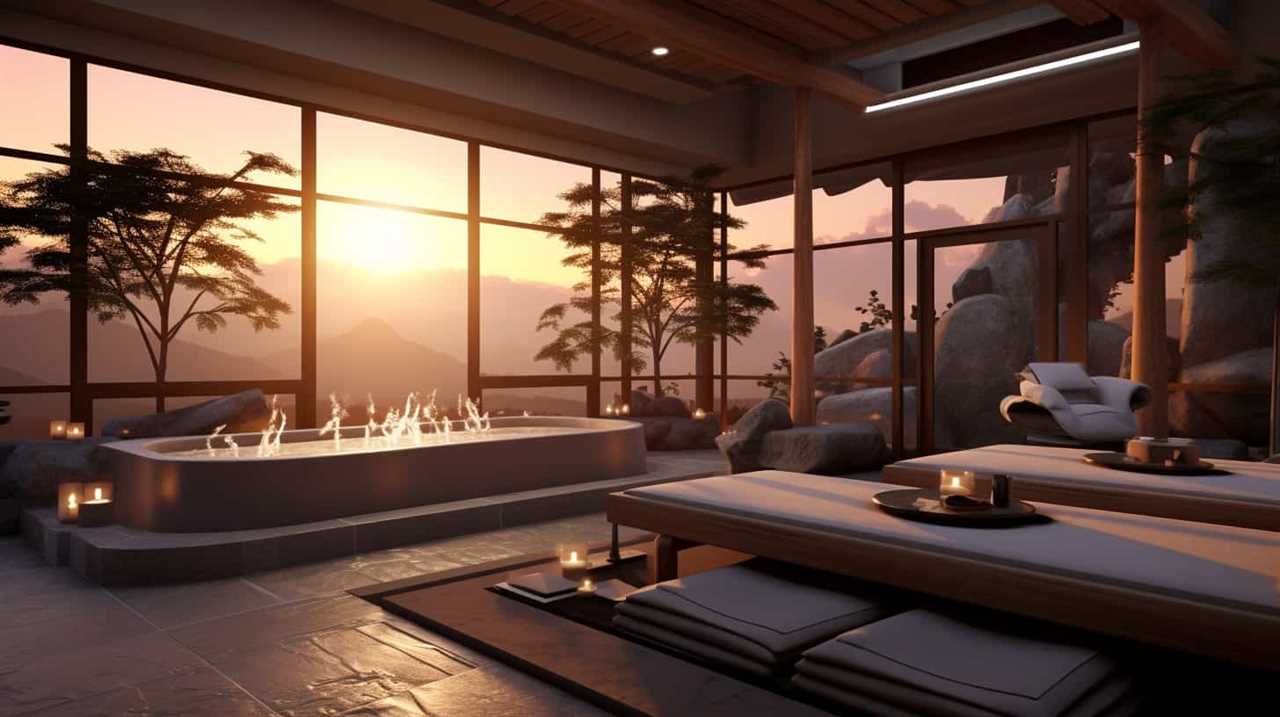
Additionally, we need to explore reinforcement options to ensure the durability of the slab.
Curing Time for Concrete
After mixing the concrete and pouring it onto the prepared area, we can begin the curing process. Proper curing is essential for achieving a strong and durable concrete slab. Here are the benefits of ensuring proper curing:
Increased Strength: The curing process allows the concrete to reach its maximum strength potential. It helps in reducing cracks and enhancing the overall structural integrity of the slab.
Improved Durability: By curing the concrete correctly, it becomes more resistant to wear and tear, weathering, and other external factors that can cause damage over time.

Minimized Shrinkage: Proper curing minimizes the shrinkage of concrete, preventing cracks from forming on the surface. This ensures a smooth and even finish, reducing the need for repairs or resurfacing.
Reinforcement Options for Durability
To ensure the durability of our concrete slab, we can reinforce it with various options for added strength and resilience during the pouring process.
One option is to use rebar placement, which involves strategically positioning steel bars within the concrete to provide additional support and prevent cracking. The rebar should be placed in a grid-like pattern, ensuring proper spacing and overlap for maximum effectiveness.
Another option is the use of concrete additives, such as fibers or admixtures. These additives can enhance the concrete’s properties, making it more resistant to cracking, shrinking, and water penetration.
Fibers, such as steel or synthetic fibers, can be added to the mix to increase tensile strength and control cracking.
Admixtures, on the other hand, can improve workability, durability, and curing time of the concrete.
Finishing Techniques
Although we’ve completed the construction of the concrete slab, there are still several finishing techniques to apply to ensure a polished and durable swim spa foundation. These techniques include:
Applying a concrete sealer: A concrete sealer acts as a protective layer that helps prevent water absorption, stains, and cracks in the slab. It enhances the durability and longevity of the foundation.

Choosing decorative finishes: Decorative finishes can enhance the aesthetic appeal of the swim spa area. Options such as stamped concrete, exposed aggregate, or colored concrete can transform the plain slab into a visually appealing surface.
Adding texture: By adding texture to the concrete surface, we can create a slip-resistant finish that ensures safety around the swim spa. This can be achieved through techniques like brooming or applying a non-slip additive to the sealer.
Curing and Maintenance
We recommend implementing a regular maintenance routine and allowing the concrete slab to cure properly for a minimum of 28 days.
Swim spa maintenance is crucial to ensure the longevity and optimal performance of your concrete slab.
To prevent cracks in concrete slabs, it’s important to follow a few key steps. Firstly, avoid placing heavy objects directly on the surface, as this can cause stress and potential cracking.
Secondly, regularly inspect the slab for any signs of damage or wear and tear. Promptly address any issues to prevent further damage.
Additionally, it’s essential to keep the slab clean and free from debris, as this can lead to deterioration over time.
Finally, consider applying a concrete sealer to provide an additional layer of protection against moisture and potential cracking.
Frequently Asked Questions
What Are the Recommended Dimensions for a Swim Spa That Would Fit on a 12’x20′ Concrete Slab?
When considering swim spa dimensions, it’s important to choose the right size and shape for your 12’x20′ concrete slab. Installation considerations such as access, weight, and water capacity should also be taken into account.
Is It Necessary to Hire a Professional Contractor for Site Preparation, Excavation, and Grading, or Can It Be Done by a Homeowner?
Hiring a professional contractor for homeowner excavation, grading, and site preparation is crucial. They have the expertise to ensure proper construction and avoid costly mistakes. Let us guide you to a successful swim spa installation.
How Long Does the Concrete Need to Cure Before the Swim Spa Can Be Installed?
Before installing the swim spa on the concrete slab, it is important to allow the concrete to cure properly. This ensures maximum strength and durability. The curing time can vary, but generally, it takes about 28 days.
What Type of Maintenance Is Required for a Concrete Slab With a Swim Spa on Top?
To maintain a concrete slab with a swim spa, regular cleaning and inspection are necessary. The benefits of a concrete slab include durability, stability, and easy access for maintenance. Our team is here to assist with any maintenance requirements you may have.
Are There Any Specific Building Codes or Permits Required for Constructing a Swim Spa on a Concrete Slab?
Building codes and permits are necessary for constructing swim spas on concrete slabs. Compliance with local regulations ensures safety and structural integrity. We can provide guidance on navigating these requirements to ensure a successful project.
Should I Build a Concrete Slab for My Decking Around the Swim Spa?
When designing swim spa decking, it’s important to consider various factors, including the installation of a concrete slab. A concrete slab offers stability, durability, and a level surface for your deck. It helps distribute the weight of the swim spa, preventing sinking or shifting over time. So, if you’re planning to install decking around your swim spa, building a concrete slab is a wise choice.
Conclusion
In conclusion, building a 12’x20′ concrete slab for a swim spa requires careful site preparation, excavation, and grading.
Reinforcement and framing are essential for ensuring the structural integrity of the slab.
Pouring the concrete and applying finishing techniques are crucial to achieving a smooth and durable surface.
Finally, proper curing and maintenance will ensure the longevity of the slab.
Just like a sturdy foundation supports a magnificent structure, this well-built concrete slab will provide a solid base for your swim spa.
- About the Author
- Latest Posts
Introducing Charles, the Editor in Chief at ByRetreat, whose passion for interior design and editorial excellence elevates every remote workspace to new heights. With his keen eye for detail, impeccable taste, and expertise in design, Charles brings a wealth of knowledge and creativity to the ByRetreat team.
As the Editor in Chief of a renowned lifestyle blog, Charles has honed his skills in curating captivating content and staying up-to-date with the latest trends in interior design. His deep understanding of aesthetics and the power of storytelling through design enables him to create remote workspaces that are not only visually stunning but also rich in personality and meaning.
Beginners Guides
The Best Time to Go on a Cruise for Perfect Weather
Sail through the maze of climate patterns to uncover the best times for perfect weather on a cruise, ensuring a memorable voyage awaits.
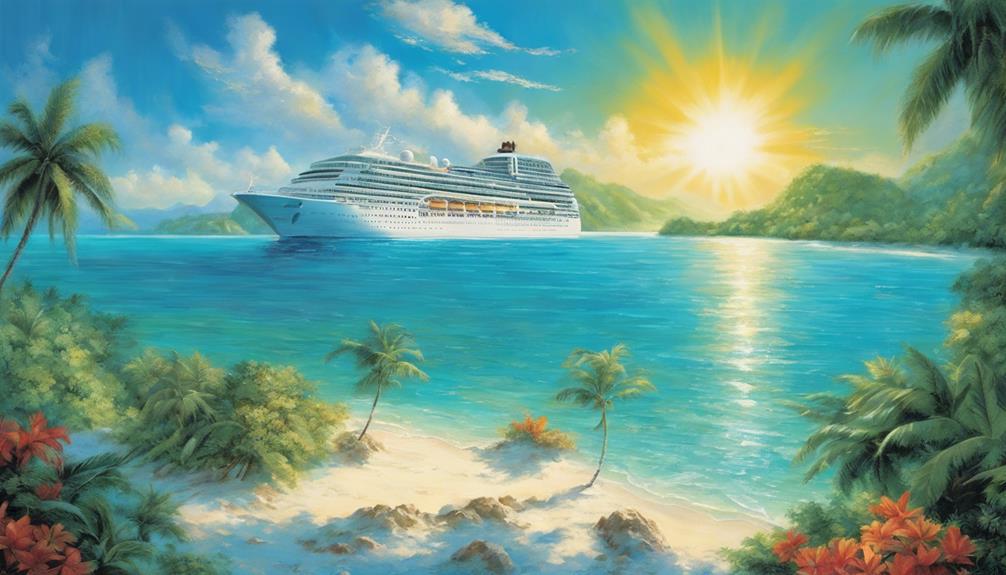
When it comes to choosing the best time to go on a cruise for perfect weather, it's like steering a maze of climate patterns to find that golden ticket. But fear not, as we have the compass to guide you in the right direction.
Understanding the seasonal nuances can make all the difference between a sun-kissed voyage and a rainy retreat. So, grab your sunscreen and pack your bags as we uncover the best times to set sail for idyllic weather conditions that will make your cruise a memorable experience.
Key Takeaways
- Caribbean cruises: December to mid-April for best weather conditions
- Alaskan cruises: Late June to mid-July for breathtaking landscapes
- Mediterranean cruises: April-May & September-October for ideal weather
- Hawaii cruises: Summer and fall months for dry weather and sunny skies
Ideal Months for Caribbean Cruises
For ideal weather conditions and a pleasant cruising experience in the Caribbean, consider booking your voyage between December and mid-April. During this period, the Caribbean boasts the best weather for cruises, with dry conditions and sunny skies prevailing. This stretch offers a fantastic opportunity to soak up the sun, enjoy water activities, and explore the stunning destinations in the region without the worry of rainstorms or excessive humidity.
Late summer into fall presents the cheapest time for Caribbean cruises, making it an excellent choice for budget-conscious travelers looking to experience the beauty of the Caribbean without breaking the bank. By opting for a cruise during this period, you can take advantage of lower prices and fewer crowds while still enjoying the warm waters and picturesque landscapes the Caribbean is known for.
Avoiding the peak season from December to April is advisable for those seeking a more peaceful and wallet-friendly experience. Sailing in late June through August allows travelers to steer clear of the crowds, particularly families on vacation during school breaks, making for a more relaxed and intimate cruise experience.
Optimal Weather for Alaskan Cruises
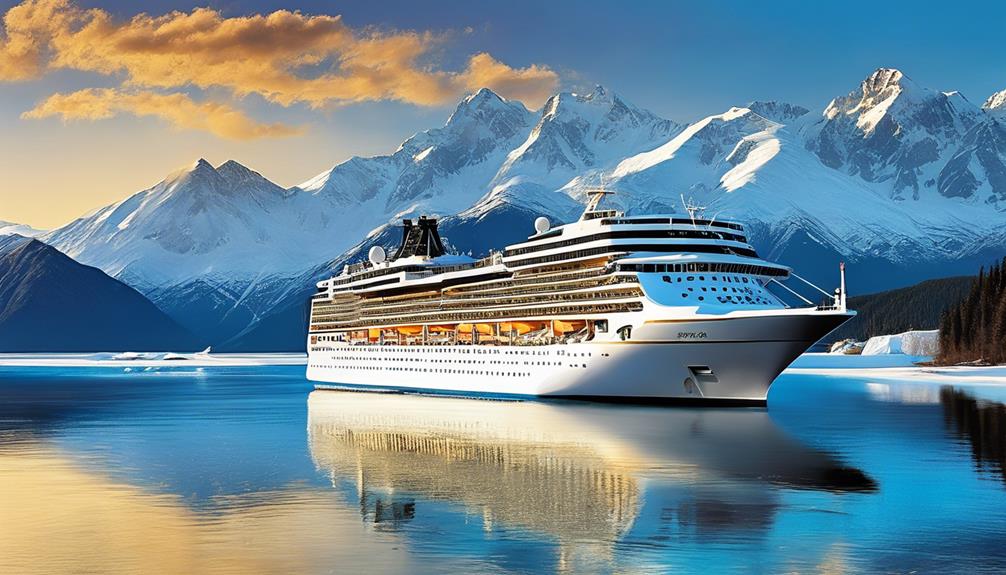
To maximize your Alaskan cruise experience, targeting late June through mid-July guarantees ideal weather conditions for enjoying the breathtaking landscapes and wildlife sightings in the region. During mid-July, you can witness the spectacular salmon run season, where various wildlife, including bears and bald eagles, gather along the rivers for this perfect phenomenon.
Late August to mid-September is another excellent window for Alaskan cruises, offering pleasant weather and often lower prices as it marks the end of the peak season. If your focus is on spotting whales, August is the prime time for your cruise, as these majestic creatures are commonly seen during this period.
For those seeking a balance between affordability and decent weather, mid-May to early June also presents a good opportunity to explore Alaska on a cruise. Keep these ideal weather periods in mind when planning your Alaskan adventure for an unforgettable experience.
Perfect Seasons for Mediterranean Cruises
April-May and September-October stand out as the prime seasons for Mediterranean cruises, offering ideal weather conditions and fewer crowds for a delightful experience exploring the region. During these shoulder seasons, the Mediterranean boasts milder temperatures and a more relaxed atmosphere compared to the peak tourist season in July and August. Traveling in April or May allows for pleasant sightseeing without the sweltering heat or overwhelming crowds. Likewise, September and October provide a serene setting for cruising with comfortable weather and less tourist congestion.
Additionally, prices for Mediterranean cruises tend to be lower from May to November, making it a cost-effective option for travelers seeking a budget-friendly voyage. Consider booking a Mediterranean cruise in May 2024 with MSC starting at $499/person to enjoy the perfect blend of favorable weather and affordable prices.
- Ideal weather conditions
- Fewer crowds
- Milder temperatures
- Lower prices during shoulder seasons
- Peak tourist season in July and August
Prime Time for Hawaii Cruises
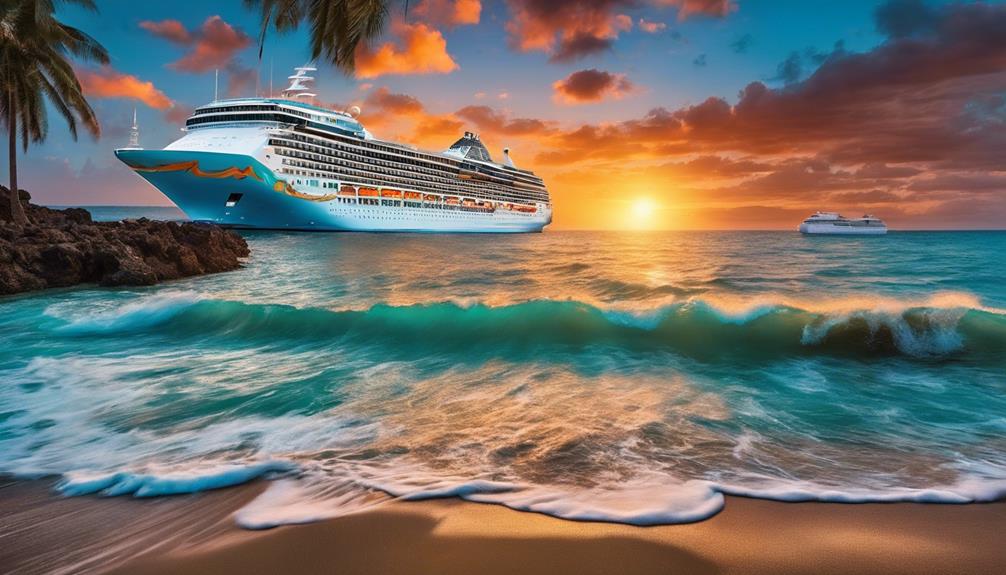
The best time to start on a Hawaii voyage is usually during the summer and fall months when the weather is dry and the skies are sunny. Hawaii cruises are particularly rewarding from mid-September through October, offering ideal conditions for a memorable experience. If you're interested in whale watching, the period from late October through May is perfect for spotting these majestic creatures in their natural habitat. During this time, the weather remains pleasant, with minimal rainfall from August through October, ensuring a smooth sailing experience.
For travelers seeking a cost-effective option, January through March can be a good time to contemplate a Hawaii cruise, although weather conditions may vary slightly. These months often offer competitive pricing and fewer crowds, allowing you to enjoy the beauty of Hawaii at a more relaxed pace. Whether you're into adventure, relaxation, or simply soaking in the stunning scenery, a Hawaii cruise during the summer and fall months promises an unforgettable journey.
Best Weather for Australia & New Zealand Cruises
For those considering voyages beyond Hawaii, exploring the best weather for Australia & New Zealand cruises becomes paramount, especially as these regions offer unique experiences throughout the year. When planning your cruise to Australia and New Zealand, keep in mind the following key points for an enjoyable voyage:
- November to March: This period offers warm temperatures and sunny weather in major ports like Sydney, making it the best time to go on a cruise in Australia & New Zealand.
- Early February to mid-March: Experience the warmest weather in Australia during these months, ensuring a comfortable cruise.
- New Zealand's Climate: With a temperate climate, layering is recommended for cruises throughout the year to stay comfortable.
- Consider Off-Peak Months: October, November, or April can provide discounted fares in Australia outside the peak season, allowing for savings on your cruise.
- Reversed Seasons: Australia and New Zealand have reversed seasons compared to the northern hemisphere, influencing the ideal timing for a cruise in these regions.
Planning your trip around these factors will help you make the most of your cruise experience in Australia and New Zealand.
Conclusion
To guarantee the best time to go on a cruise for perfect weather is essential for a memorable and enjoyable experience. By researching the ideal months for different regions like the Caribbean, Alaska, Mediterranean, Hawaii, Australia, and New Zealand, you can secure smooth sailing and sunny skies.
Don't just take our word for it, investigate the truth of this theory yourself and discover the magic of cruising in ideal weather conditions.
- About the Author
- Latest Posts
Introducing Ron, the home decor aficionado at ByRetreat, whose passion for creating beautiful and inviting spaces is at the heart of his work. With his deep knowledge of home decor and his innate sense of style, Ron brings a wealth of expertise and a keen eye for detail to the ByRetreat team.
Ron’s love for home decor goes beyond aesthetics; he understands that our surroundings play a significant role in our overall well-being and productivity. With this in mind, Ron is dedicated to transforming remote workspaces into havens of comfort, functionality, and beauty.
Beginners Guides
The Best Time to Cruise for Budget-Friendly Deals
Fulfill your wanderlust dreams without draining your wallet by learning the key to scoring budget-friendly cruise deals.
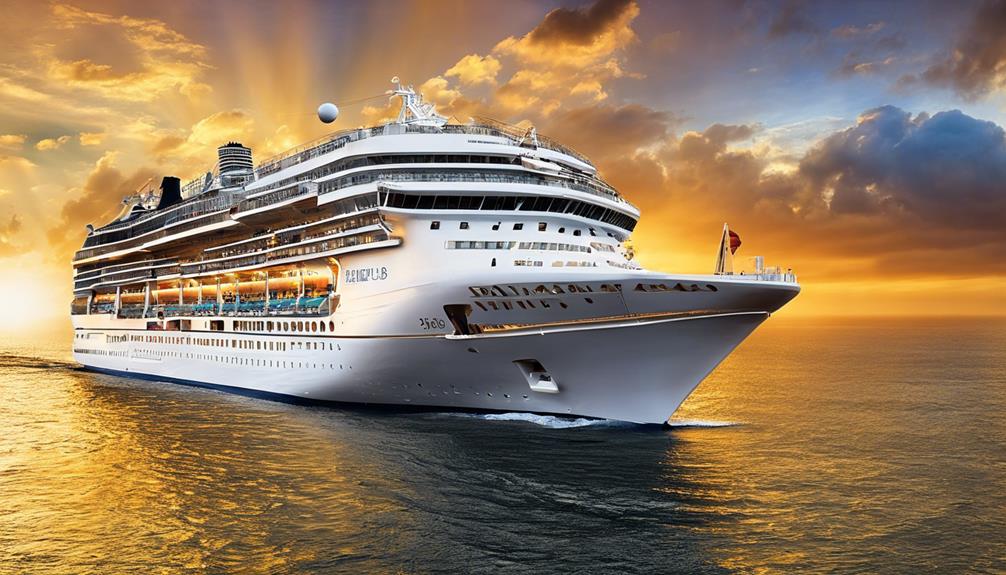
When it comes to finding budget-friendly cruise deals, timing is key. Imagine setting sail on the crystal blue waters of the Caribbean or exploring the stunning glaciers of Alaska without breaking the bank.
There's a specific window of opportunity that savvy cruisers keep an eye on to secure the best rates and save some serious cash. But how do you know when to book your next adventure to make the most of your budget?
Let's uncover the secrets behind scoring the ultimate cruise deals and making your dream vacation a reality.
Key Takeaways
- Booking during wave season in January to March ensures budget-friendly deals.
- Monitoring prices post-booking for drops leads to potential refunds or upgrades.
- Repositioning cruises in spring and fall offer cost-effective options.
- Leveraging loyalty programs maximizes savings for affordable cruising.
Ideal Seasons for Budget-Friendly Cruises
When seeking budget-friendly cruise deals, timing plays an important role in securing the best value for your money. Shoulder seasons such as September, October, and early December present excellent opportunities for travelers looking for cheaper fares. These off-peak times often offer discounted rates and fewer crowds, making it an ideal choice for budget-conscious individuals.
Additionally, booking during wave season in January and February can lead to significant discounts and promotions, maximizing savings on your cruise vacation.
Repositioning cruises during spring and fall are another fantastic option for savvy travelers seeking affordable deals. These cruises often provide cost-effective choices as cruise lines move their ships between different regions.
Avoiding major holidays and school breaks is also key to securing cheaper cruise fares and ensuring a more relaxed cruising experience. Moreover, sailing from Florida during off-peak times can offer a wide range of options and better deals for those looking to save on their cruise adventures.
Strategies for Booking Affordable Cruises
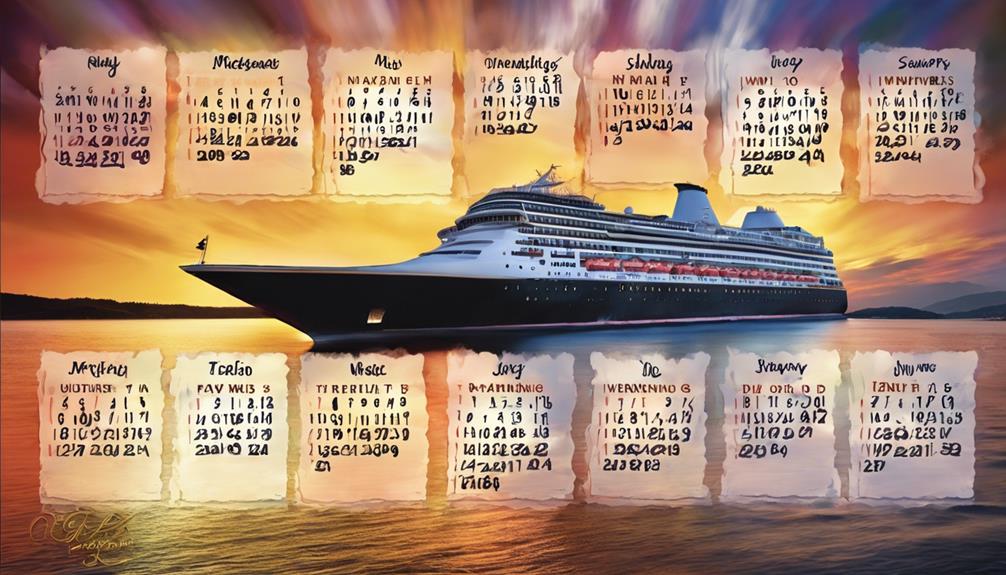
To secure the best deals on cruises, it's important to employ strategic booking approaches that maximize cost savings and value for your vacation. When aiming for budget-friendly cruise deals, consider the following strategies:
- Booking in Advance: Securing your cruise early, especially during wave season from January to March, can lead to lower rates and additional benefits.
- Monitoring Fare Changes: Keep an eye on fluctuating fares and be ready to book when prices drop to secure the best deal.
- Being Flexible with Travel Dates: Flexibility can be key in finding affordable cruise options, as adjusting your travel dates slightly can result in significant savings.
- Considering Repositioning Cruises: Exploring repositioning cruises or sailing during shoulder seasons can offer unique routes and discounted prices.
- Utilizing Loyalty Programs and Off-Peak Times: Take advantage of loyalty programs, monitor price drops, and consider traveling during off-peak times to maximize your savings on cruise vacations.
Best Times to Score Cruise Deals
During wave season from January to March, travelers can capitalize on the best times to secure budget-friendly cruise deals. Booking well in advance is key to snagging the most favorable timing and rates for your cruise.
Additionally, considering repositioning cruises during the spring and fall can offer discounted prices, making them a great option for those seeking budget-friendly deals. It's also advisable to keep an eye out for price drops even after booking, as this could potentially lead to refunds or upgrades for your cruise experience.
Leveraging loyalty programs or memberships can grant you access to exclusive discounts and savings on your upcoming cruise. By being proactive and strategic in your approach to booking and monitoring deals, you can maximize your chances of finding the best cruise deals that align with your budget and preferences.
Timing Tips for Budget-Friendly Cruises
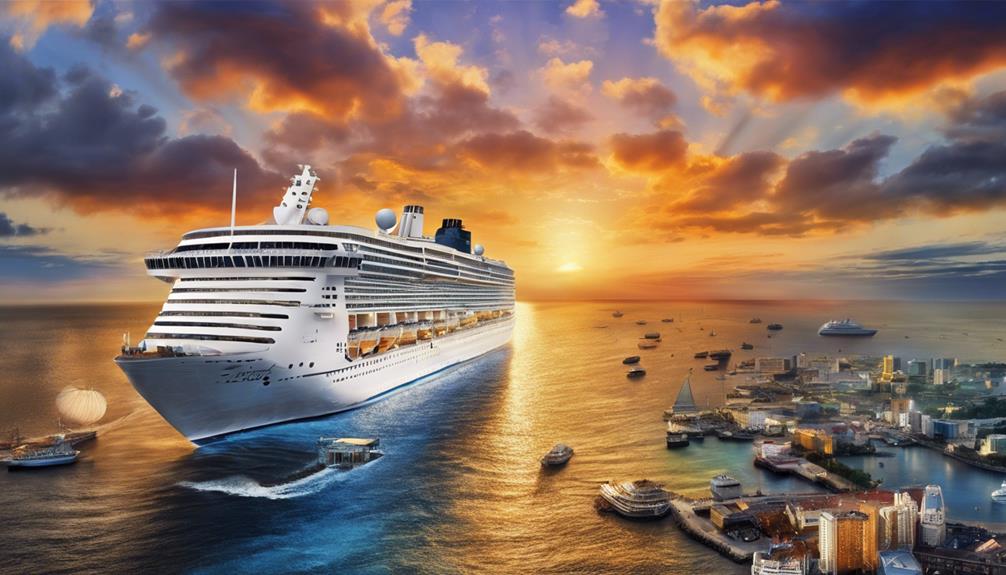
Let's explore practical strategies for maximizing your savings on budget-friendly cruises through strategic timing tips. When aiming to secure the best cruise deals that align with your budget, consider the following insights:
- Booking in Advance: Take advantage of wave season from January to March to lock in lower rates and secure desirable cabin options.
- Monitoring Prices: Keep an eye on price drops even after booking to potentially benefit from refunds or upgrades, enhancing your overall cruise experience.
- Loyalty Programs: Utilize loyalty programs or memberships to access additional discounts and exclusive perks, making your budget-friendly cruise even more cost-effective.
- Nearby Ports: Opt for cruises departing from nearby ports to save on airfare costs, enabling you to allocate more of your budget towards onboard activities and excursions.
- Discounts Galore: Embrace the array of discounts available during wave season and beyond, ensuring that you snag the best possible deal for your budget-friendly cruise adventure.
When to Book for Cruise Savings
Securing cruise savings hinges on strategic timing and proactive booking practices. To find the best deals, consider booking during wave season from January to March when many cruise lines offer enticing discounts.
Booking early not only guarantees better rates but also provides a wider selection of cabin choices. Keep an eye out for fare changes even after booking, as price drops may occur, presenting an opportunity for additional savings.
While waiting for last-minute deals can sometimes lead to the cheapest rates, this approach often comes with limited cabin availability. To stay informed about price fluctuations, utilize tools like the Shipmate app and Cruise Critic for efficient monitoring.
Conclusion
To summarize, cruising during the off-peak season can help us save some serious dough. Booking early during wave season is key to scoring those sweet deals.
So, let's set sail and make some memories without breaking the bank. Remember, early bird gets the worm – or should I say, the cruise discount!
- About the Author
- Latest Posts
Introducing Ron, the home decor aficionado at ByRetreat, whose passion for creating beautiful and inviting spaces is at the heart of his work. With his deep knowledge of home decor and his innate sense of style, Ron brings a wealth of expertise and a keen eye for detail to the ByRetreat team.
Ron’s love for home decor goes beyond aesthetics; he understands that our surroundings play a significant role in our overall well-being and productivity. With this in mind, Ron is dedicated to transforming remote workspaces into havens of comfort, functionality, and beauty.
Beginners Guides
Best Time to Go on an Alaskan Cruise for Wildlife Watching
Get ready to discover the optimal time for wildlife enthusiasts to embark on an Alaskan cruise – the ultimate season for extraordinary encounters awaits!

One could contend that any time of year is fitting for an Alaskan cruise, but if you genuinely want to maximize your wildlife watching opportunities, timing is key.
While many months offer glimpses of nature's wonders, there is a particular period that stands out above the rest.
Join us as we explore the intricacies of the Alaskan wilderness and uncover the secrets of when to set sail on a journey that promises unforgettable encounters with some of the most magnificent creatures on earth.
Key Takeaways
- Prime months for wildlife viewing in Alaska are May, June, and September.
- Peak whale watching season is from mid-June to August.
- Best time for bear spotting is between July and early September.
- Ideal months for bald eagle sightings in southeast Alaska are from May to September.
Prime Months for Wildlife Viewing
During the prime months of May, June, and September, Alaska offers the best conditions for wildlife enthusiasts to observe a diverse array of animals in their natural habitats. June marks the beginning of summer, a time when the landscape comes alive with the sights and sounds of wildlife.
July and August are ideal for witnessing brown bears fishing for salmon and catching glimpses of majestic moose roaming through the wilderness. These months provide ample opportunities for up-close wildlife viewing experiences, especially during the salmon run when bears gather along the rivers to feast.
As the summer changes into September, visitors can look forward to spotting humpback whales during their annual migration, as well as witnessing the spectacular spawning salmon and caribou herds moving across the land. The shoulder seasons offer a unique chance to explore Alaska inside and out, with fewer crowds and mosquitoes, making it an ideal time for wildlife enthusiasts to immerse themselves in the natural beauty of the region.
Peak Whale Watching Season
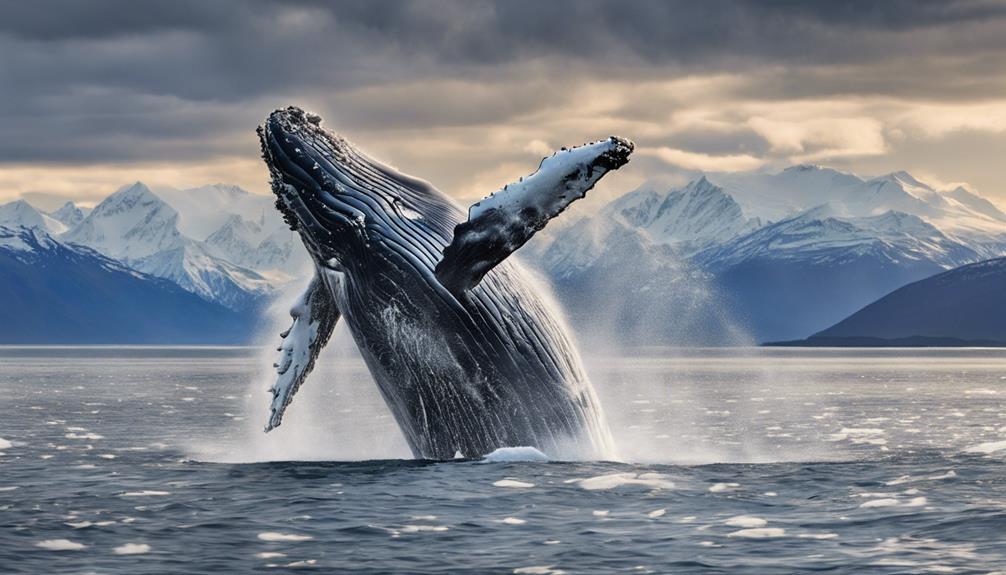
In the peak whale watching season in Alaska, which typically spans from mid-June to August, enthusiasts have the best opportunities to witness humpback whales and other species in their natural habitat. Humpback whales are commonly sighted during the summer months as they feed on small fish and krill.
Killer whales, also known as orcas, are best spotted in May and June near Ketchikan, Juneau, and Seward, hunting for seals and other marine mammals. Grey whales migrate to southern Alaska in late spring, showcasing their impressive breaching behaviors.
Blue whales, the largest animals on Earth, may be seen in July and August, traveling through Alaskan waters in search of food. Whale sightings can vary depending on the specific month of your Alaskan cruise, so choosing the right time within the peak season is important for maximizing wildlife watching opportunities while sailing through these majestic waters.
Best Time for Bear Spotting
Ideally situated between July and early September, the peak time for bear spotting in Alaska coincides with the salmon influx that attracts these magnificent creatures to the creeks and streams of the region. During this period, Grizzly bears can be observed in their natural habitat, offering a thrilling experience for wildlife enthusiasts. Royal Caribbean Cruise Tours in Alaska often include bear viewing excursions, enhancing the opportunity to witness these powerful animals up close. For best bear sightings, consider visiting during the salmon run in July, a time when bears are actively hunting for fish in creeks and streams, particularly in locations like Ketchikan. Alaska's diverse landscapes and ecosystems provide ample opportunities for bear viewing, from observing black bears to encountering majestic brown bears. Whether through guided tours or remote float plane trips, Alaska offers a range of experiences to witness these iconic creatures in their element.
| Best Time for Bear Spotting | |
|---|---|
| July | Salmon run |
| Early September | Grizzly bears |
| Creeks | Streams |
| Ketchikan | Royal Caribbean Cruise Tours |
Ideal Months for Eagle Sightings
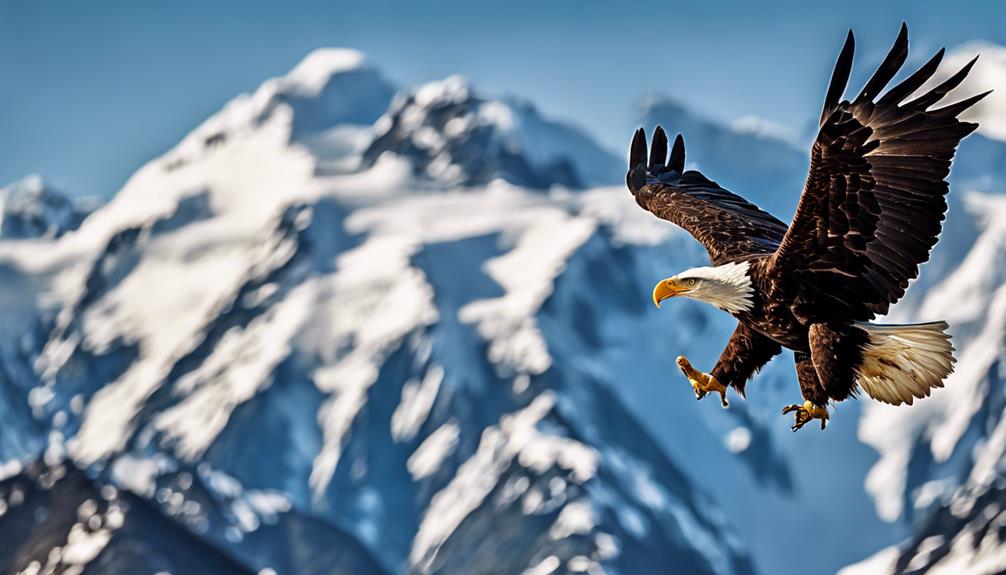
The peak months for perfect bald eagle sightings in southeast Alaska are from May to September. During these months, as part of an Alaska cruise, birdwatching enthusiasts can witness the majestic bald eagles in their natural habitat. Southeast Alaska, home to around 30,000 bald eagles, offers ample opportunities for wildlife watching, especially near bodies of water where eagles are commonly spotted.
The Sitka Cultural Discovery excursion is a great way to observe bald eagles up close, as they're frequently seen near streams and bodies of water. With approximately 470 bird species in the region, including the iconic bald eagle, Southeast Alaska provides a diverse birdwatching experience for nature lovers.
Whether soaring through the skies or perched on branches overlooking the water, bald eagles are a common sight throughout the summer months in this pristine Alaskan wilderness. For those seeking unforgettable eagle sightings and a chance to immerse themselves in Alaska's rich wildlife, visiting during the peak months offers an unparalleled birdwatching experience.
Optimal Time for Otter Encounters
Best timing for observing otters in Alaska ranges from early spring through the end of July. During this period, the chances of encountering these enchanting creatures are at their peak. Here are some key points to keep in mind for prime otter encounters during your Alaskan cruise:
- Steller sea lions: While otters are more prevalent during spring and early summer, Steller sea lions can be spotted year-round in Alaska. Keep an eye out for these majestic marine mammals as they often share habitats with otters.
- Streams and creeks: Otters are frequently seen near streams and creeks, making these areas prime locations for wildlife watching. Cruise along these waterways to increase your chances of a memorable otter sighting.
- Wildlife tours: Participating in wildlife tours in Alaska can enhance your otter encounters. These tours often provide opportunities to get up close to Steller sea lions, with otters sometimes making surprise appearances alongside them.
- Sea otters near the ocean: Whether near the ocean or inland water bodies, otters are adaptable creatures that thrive in various environments. Keep a lookout for these playful animals during your Alaskan cruise for a truly immersive wildlife experience.
Conclusion
To sum up, our investigation confirms that the best time to go on an Alaskan cruise for wildlife watching is indeed during the peak season of July.
The abundance of wildlife sightings, perfect weather conditions, and increased chances of spotting bears, whales, eagles, otters, and other fascinating creatures make July the ideal month for an unforgettable Alaskan wildlife experience.
Don't miss out on this prime opportunity to witness the wonders of nature in their natural habitat.
- About the Author
- Latest Posts
Introducing Ron, the home decor aficionado at ByRetreat, whose passion for creating beautiful and inviting spaces is at the heart of his work. With his deep knowledge of home decor and his innate sense of style, Ron brings a wealth of expertise and a keen eye for detail to the ByRetreat team.
Ron’s love for home decor goes beyond aesthetics; he understands that our surroundings play a significant role in our overall well-being and productivity. With this in mind, Ron is dedicated to transforming remote workspaces into havens of comfort, functionality, and beauty.
-

 Vetted3 weeks ago
Vetted3 weeks ago15 Best Drip Irrigation Systems to Keep Your Garden Thriving
-

 Vetted3 days ago
Vetted3 days ago15 Best Foot Massagers for Neuropathy to Soothe Your Feet and Relieve Discomfort
-
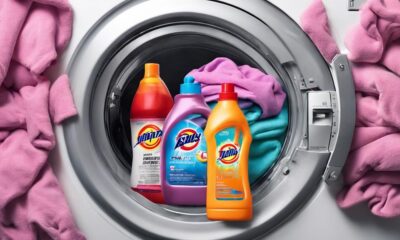
 Vetted1 week ago
Vetted1 week ago15 Best Sports Laundry Detergents for Keeping Your Activewear Fresh and Clean
-

 Vetted2 weeks ago
Vetted2 weeks ago15 Best Tall Toilets for Seniors That Combine Comfort and Safety
-

 Vetted2 weeks ago
Vetted2 weeks ago15 Best Dish Scrubbers to Keep Your Kitchen Sparkling Clean
-

 Beginners Guides4 weeks ago
Beginners Guides4 weeks agoDesigning Your Retreat Center – Essential Tips
-

 Beginners Guides4 weeks ago
Beginners Guides4 weeks agoAre Retreats Profitable
-

 Decor2 weeks ago
Decor2 weeks agoWhat Is Eclectic Home Decor


